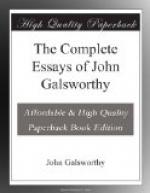It is strange how this tranquillity of night, that seems so final, is inhabited, if one keeps still enough. A lamb is bleating out there on the dim moor; a bird somewhere, a little one, about three fields away, makes the sweetest kind of chirruping; some cows are still cropping. There is a scent, too, underneath the freshness-sweet-brier, I think, and our Dutch honeysuckle; nothing else could so delicately twine itself with air. And even in this darkness the roses have colour, more beautiful perhaps than ever. If colour be, as they say, but the effect of light on various fibre, one may think of it as a tune, the song of thanksgiving that each form puts forth, to sun and moon and stars and fire. These moon-coloured roses are singing a most quiet song. I see all of a sudden that there are many more stars beside that one so red and watchful. The flown kite is there with its seven pale worlds; it has adventured very high and far to-night-with a company of others remoter still. . . .
This serenity of night! What could seem less likely ever more to move, and change again to day? Surely now the world has found its long sleep; and the pearly glimmer from the moon will last, and the precious silence never again yield to clamour; the grape-bloom of this mystery never more pale out into gold . . . .
And yet it is not so. The nightly miracle has passed. It is dawn. Faint light has come. I am waiting for the first sound. The sky as yet is like nothing but grey paper, with the shadows of wild geese passing. The trees are phantoms. And then it comes—that first call of a bird, startled at discovering day! Just one call—and now, here, there, on all the trees, the sudden answers swelling, of that most sweet and careless choir. Was irresponsibility ever so divine as this, of birds waking? Then—saffron into the sky, and once more silence! What is it birds do after the first Chorale? Think of their sins and business? Or just sleep again? The trees are fast dropping unreality, and the cuckoos begin calling. Colour is burning up in the flowers already; the dew smells of them.
The miracle is ended, for the starling has begun its job; and the sun is fretting those dark, busy wings with gold. Full day has come again. But the face of it is a little strange, it is not like yesterday. Queer-to think, no day is like to a day that’s past and no night like a night that’s coming! Why, then, fear death, which is but night? Why care, if next day have different face and spirit? The sun has lighted buttercup-field now, the wind touches the lime-tree. Something passes over me away up there.
It is Felicity on her wings!
1912.
STUDIES AND ESSAYS
By John Galsworthy
“Je vous dirai que
l’exces est toujours un mal.”
—Anatole
France




